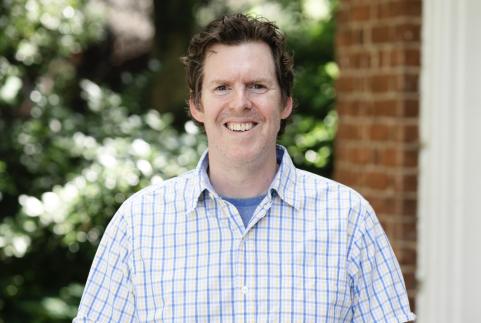Meet Chris Deppmann, Professor of Biology, Biomedical Engineering, Cell Biology, and Neuroscience

Christopher Deppmann, PhD, is a Professor of Biology, Biomedical Engineering, Cell Biology, and Neuroscience at UVA. Dr. Deppmann describes his interests and his advice for building impactful scientific collaborations.
Brain Institute: Briefly describe your current research projects and interests.
Dr. Deppmann: Right now, our research is all about understanding how the nervous system is put together and taken apart, especially in the context of neural development, function, and disease, including injury and Alzheimer's. Another big focus is using single cell proteomics to understand the molecular signature of hunger, nervous system assembly, and neural signaling.
How did you get your start in the field of neuroscience?
I loved thinking about how cells talk to each other. There is no better place to look at that than in the developing nervous system. We found that the principles used during development are recycled in nervous system function and response to pathology.
Could you tell us about one of your most impactful research collaborations?
There are too many key collaborations to highlight just one. With Eli Zunder, I explore single cell proteomics, while Ali Guler and I investigate the neural and molecular mechanisms underlying hunger. Together with Sarah Kucenas and John Campbell, we study how glial cells respond to axonal injury, and with Bettina Winckler, I examine how target-derived signals communicate over long distances. These collaborations, along with many others, drive our science in fascinating directions and create a supportive, enriching environment for our trainees, most of whom are co-mentored.
Why are collaborations important to your research program?
Collaboration is everything. Neuroscience is so interdisciplinary, and it takes a team with different skill sets—from structural biology to systems neuroscience and behavior—to tackle the big questions. Collaborations allow us to study neuroscience across different scales, from molecules to entire organisms, and across various model systems, providing a more comprehensive understanding. Working with others gives us new ways to think about problems and lets us innovate in ways that wouldn’t be possible if we were just working alone.
What advice do you have about initiating and building successful and sustainable collaborations?
Start with genuine curiosity about what your colleagues are doing and be open to learning from them. Be upfront about what you expect, timelines, and who’s doing what. A sustainable collaboration is all about being generous—valuing everyone’s contributions and making sure your partners feel uplifted.
What advice do you have for trainees and/or junior investigators?
Be present in every aspect of your work, and bring joy to what you do. Find fulfillment in the process itself—embrace the ups and downs not as obstacles, but as essential parts of the journey that enrich the experience. Embracing difficult challenges is a profound opportunity for growth. The Buddhist principle of dukkha teaches us that while suffering is inevitable, there is beauty and growth in facing discomfort and persevering through tough challenges. This work is both challenging and rewarding—embracing the difficult moments makes the breakthroughs all the more fulfilling.
What’s something new that you’ve learned recently (at work or outside of work)?
Lately, I've been really into exploring moral philosophy—think 'The Good Place' and the challenge of balancing personal growth with what we owe each other as a community. It's been a fascinating journey into the ideas of individual flourishing versus collective responsibility. Every day, I try to learn something new. Recently, it's been a deep dive into energy metabolism—from the Warburg effect in cancer cells to oxidative phosphorylation in healthy tissues. I'm amazed by how neurons and glial cells adapt their energy needs, striking a balance between activity, repair, and resilience. But honestly, I let my curiosity lead the way—whether it’s diving into cooking experiments, tracking macroeconomic trends, exploring the latest in technology, or studying attachment theory. I love discovering new things, wherever that journey might take me.
Where are you from originally?
I'm originally from Ann Arbor, Michigan. I used to love the fall—the smell of burning leaves, football Saturdays, and tailgating. It was great to be around a proper college town, which I think is one of the reasons I love living in Charlottesville so much.
What’s your favorite way to spend a day off?
I love spending my day off with my wife Abbie, playing tennis, throwing the ball to the dog, or checking out a great restaurant in town. Sometimes, it's also nice to just relax on the couch, watch a movie, and take it easy—recharging doesn't always have to be active.
What is a surefire way to make you laugh?
My wife and dog are both goofballs, and they never fail to make me laugh, there's always something amusing happening at home.